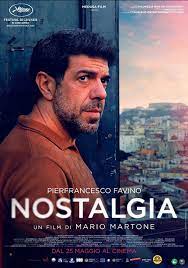
NOSTALGIA
Italy, 2022, 116 minutes, Colour.
Pierfrancesco Favino, Francesco Di Leva, Tommaso Ragno, Aurora Quattrocchi, Sofia Essaidi, Nello Mascia.
Directed by Mario Martone.
Nostalgia is a serious portrait and study, not without some light touches, of a man who has been away from where he grew up, Naples, for 40 years. As with so many men and women who roam, there is still somewhere they call home. And it creates a longing, perhaps reviving true and false memories, and nostalgia.
Felice, Pierfrancesco Favino, popular in many recent Italian films, is flying in from Cairo, wanting to see his ageing mother. But, there is a deeper motivation from the past – and there are many memory flashbacks throughout the film, indicated by a change of screen format, square – his growing up, rowdy, his friend, Oreste, with whom he shared happy biking days on the beach but whose actions led to a crisis, aged 15, and his being hurried out of the country by his uncle, returning only now.
There are some moving sequences as Felice rediscovers his mother, caring for her. But, at her funeral (and there have been some visual indications that he has embraced Islam with his wife in Cairo), he observes, detached, but he appreciates the words of the local parish priest, Don Luigi (Francesco De Leva). Felice had previously noticed him celebrating Mass with a crowd outside the cathedral, defying authorities and corruption, defying the widespread influence of the Camorra.
For audiences interested in portrayal of Catholic priests in more recent years, many critical and denunciatory, here is a very earnest priest, close to his parishioners, supporting young people (both in a gym and in creating an orchestra), welcomed into homes, but defying the local gangster culture and crime. He is sympathetic to Felice, acts almost as confessor and therapist.
And he warns Felics about his friend, Oreste, his leadership of local thugs and crime. Nevertheless, Felice wants to meet Oreste, to revisit the past, to understand it, to bond again with his one-time close friend.
There are two possible endings for a film about contemporary Naples and its crime problems – hope that the spirit of Don Luigi offers some optimism or regrets that the violence and vengeance of Oreste will prevail.
- The title? For Felice? His growing up, happiness, regrets, fears? 40 years away from Naples? His return, his mother, the effect of the city, the influence of Don Luigi, his quest to seek out Oreste?
- The emotional impact for an Italian audience? Identifying with Felice? For non-Italians, awareness of Naples, poverty, criminals, the Camorra? The role of the Catholic Church and priests?
- The portrait of Felice, on the plane, arriving in Naples, after 40 years, his age, experience? The hotel and settling in? In the streets, going to visit his mother, the reunion? Her moving from her flat? The broken phone, her eyes, friends reading his letters to her? His buying the bathroom soaps and sponges, bathing his mother, she bathing him as a boy, his bathing her as an adult? The bond between them? Talking, memories?
- The design of the flashbacks, the use of the square frame format? Felice as a boy, 15 years old, the motorbike, with Oreste, going to the beach, their friendship? Robbery, Oreste and the murder, Felice and his fear, escaping, his uncle and the confession, his uncle getting him out of the country to work in Lebanon, South Africa, Cairo? The long memory?
- His mother’s death, the funeral, the indication of his conversion to Islam? Thanking Don Luigi? The donation? The friendship, the visits, the discussions, the equivalent of confession?
- Don Luigi, corruption in Naples, his being forbidden to celebrate Mass outside the cathedral, his defying the authorities, the crowds, his urgent preaching? One with the people? The gym adjacent to the church, the young people and boxing (and his persuading Felice to let go himself and box)? The orchestra? The young people? The opening up of the catacombs and the hopes for tourists and the economy? The refugees from Africa, his getting Felice to translate the young man from Tunisia? Felice and his further involvement with the group, the visit to the catacombs, and his later hiding his house contract there?
- The glimpse of Oreste as an old man, his reputation as Badman, with the prostitute, his age, white hair? Memories of the past? His never being convicted for the murder? The danger with Felice’s return, and his strategy of blaming Felice for the murder and running away?
- The character of Don Luigi, the Neapolitan priest, full of energy, devout and celebrating Mass, funerals? Social concern, knowing families, visiting for meals and their welcome, even the drug dealing families, helping the son to borrow a violin? His inviting Feiice to visit with him?
- His advice to Felice, listening to the story, the equivalent of confession? Getting the young men to guard Felice? Felice and his buying the motorbike, Oreste and the men burning it, the graffiti on the wall for him to disappear?
- His making contact with Oreste’s guards, the rendezvous, the blindfold, the interview with Oreste, the frank talking, the memories, Felice and his need to contact Oreste, the possibility of friendship?
- The contact with his wife in Cairo, the phone calls, showing her the dancing on his phone, who work in the hospital, eager to go to Naples? Buying the ticket, the plan? Felice and his wanting to buy a house, discussion with the agents?
- Going for the walk, Oreste in his hood, going for the walk, the encounter, Oreste killing Felice?
- In the end of the film? Audience hopes that there will be some kind of redemption in Naples? But the reality of crime, corruption, hatred and violence?